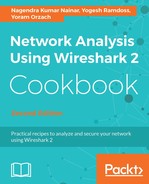The basic layer 3 filters are:
- ip or ip6: To capture IP or IPv6 packets.
- host <host>: To get a hostname or address.
- dst host <host>: To get a destination hostname or address.
- src host <host>: To get a source hostname or address.
A host can be an IP address or a hostname related to this number. You can type, for example, a filter host www.packtpub.com that will show you all packets to/from the IP address related to the Packt website.
- gateway <Host name or address>: Captures traffic to or from the hardware address but not to the IP address of the host. This filter captures traffic going through the specified router. This filter requires a hostname that can be found by the local system's name resolution process (for example, DNS).
- net <net>: All packets to or from the specified IPv4/IPv6 network.
- dst net <net>: All packets to the specified IPv4/IPv6 destination network.
- src net <net>: All packets to the specified IPv4/IPv6 destination network.
- net <net> mask <netmask>: All packets to/from the specific network and mask. This syntax is not valid for the IPv6 network.
- dst net <net> mask <netmask>: All packets to/from the specific network and mask. This syntax is not valid for the IPv6 network.
- src net <net> mask <netmask>: All packets to/from the specific network and mask. This syntax is not valid for the IPv6 network.
- net <net>/<len>: All packets to/from the net network with len length in bits.
- dst net <net>/<len>: All packets to/from the net network with len length in bits.
- dst net <net>/<len>: All packets to/from the net network with len length in bits.
- broadcast: All broadcast packets.
- multicast: All multicast packets.
- ip proto <protocol code>: Captures packets while the IP protocol field equals the protocol identifier. There can be various protocols, such as TCP (code 6), UDP (code 17), ICMP (code 1), and so on.
Instead of writing ip proto and protocol code, you can write ip proto <protocol name>, for example ip proto cp.
- ip6 proto <protocol>: Captures IPv6 packets with the protocol indicated in the type field. Note that this primitive does not follow the IPv6 extension headers chain.
In an IPv6 header, there is a field in the header that can point to an optional extension header, which in turn points to the next extension header, and so on. In the current version, Wireshark capture filters do not follow this structure.
- icmp[icmptype]==<identifier>: Captures ICMP packets while the identifier is an ICMP code, such as icmp-echo and icmp-request.
